Leader of the Communist Party of China
The leader of the Central Committee of the Communist Party of China is the highest ranking official and head of the Chinese Communist Party. Since 1982, the leader of the Communist Party of China (CPC) is equivalent to the office of the General Secretary of the Central Committee. Since its formation in 1921, the leader's post has been titled as Secretary of the Central Bureau (1921–1922), Chairman (1922–1925, 1928–1931, and 1943–1982), and General Secretary (1925–1928, 1931–1943, and 1982 onwards).
| General Secretary/Chairman of the Central Committee of the Communist Party of China
中共中央主要负责人 | |
|---|---|
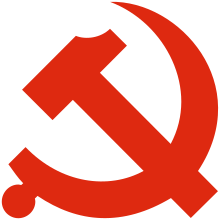 Logo of the Communist Party of China | |
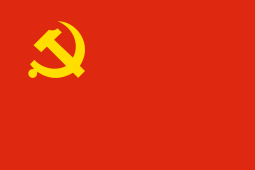 Flag of the Communist Party of China | |
| Politburo, Politburo Standing Committee Secretariat | |
| Type | Party leader |
| Reports to | National Congress of the Communist Party of China |
| Seat | Zhongnanhai Beijing, People's Republic of China |
| Nominator | Central Committee of the Communist Party of China |
| Appointer | Central Committee of the Communist Party of China |
| Term length | Five years, no term limit |
| Constituting instrument | Constitution of the Communist Party of China |
| Inaugural holder | Chen Duxiu |
| Formation | 1 July 1921 |
| Deputy | Vice Chairman (1956–1982) |
| leader of the Communist Party of China Central Committee | |||||||
|---|---|---|---|---|---|---|---|
| Simplified Chinese | 中共中央主要负责人 | ||||||
| Traditional Chinese | 中共中央主要負責人 | ||||||
| Literal meaning | CPC Central Committee primary responsible person | ||||||
| |||||||
By custom the party leader has either been elected by the Central Committee or the Central Politburo.[1] There were several name changes until Mao Zedong finally formalised the office of Chairman of the Central Committee.[1] Since 1982, the CPC National Congress and its 1st CC Plenary Session has been the main institutional setting in which the CPC leadership are elected.[1] From 1992 onwards every party leader has been elected by a 1st CC Plenary Session. In the period 1928–45 the CPC leader was elected by conference, meetings of the Central Committee or by decisions of the Politburo.[1] The last exception to this rule is Jiang Zemin, who was elected at the 4th Plenary Session of the 13th Central Committee in the aftermath of the Tiananmen Square protests of 1989.[2] Currently, to be nominated for the office of General Secretary, one has to be a member of the Politburo Standing Committee.[3]
Despite breaching the party's constitution, several individuals (who are not included in the list) have been de facto leaders of the CPC without holding formal positions of power.[4] Wang Ming was briefly in charge in 1931 after Xiang Zhongfa was jailed by Kuomintang forces, while Li Lisan is considered to have been the real person in-charge for most of Xiang's tenure.[4] Deng Xiaoping is the last CPC official to achieve this; he never served as Chairman or General Secretary, his highest post being Chairman of the Central Military Commission (Commander-in-Chief).[5]
Leader offices
| Title | Existence | Established |
|---|---|---|
| Secretary of the Central Bureau | 1921–1922 | 1st National Congress |
| Chairman of the Central Executive Committee | 1922–1923 | 2nd National Congress |
| General Secretary of the Central Bureau | 1923–1925 | 3rd National Congress |
| General Secretary of the Central Executive Committee | 1925–1927 | 4th National Congress |
| General Secretary of the Central Committee | 1927–1928 | 5th National Congress |
| Chairman of the Central Committee | 1928–1931 | 6th National Congress |
| General Secretary of the Central Committee | 1931–1943 | 4th Plenary Session of the 6th Central Committee |
| Chairman of the Central Politburo | 1943–1945 | Politburo resolution |
| Chairman of the Central Secretariat | 1943–1945 | Politburo resolution |
| Chairman of the Central Committee | 1945–1982 | 7th National Congress |
| General Secretary of the Central Committee | 1982 onwards | 12th National Congress |
Leaders
| No. | Name (birth–death) |
Took office | Left office | Length of tenure | Central Committee | Portfolios held while leader | Portrait |
|---|---|---|---|---|---|---|---|
| 1 | Chen Duxiu 陈独秀 (1879–1942) |
1 July 1921 | 7 August 1927 | 6 years and 38 days | 2nd (1922–23) 3rd (1923–25) 4th (1925–27) |
— |
 |
| 2 | Xiang Zhongfa 向忠发 (1880–1931) |
1 July 1928 | 24 June 1931 | 2 years and 359 days | 5th (1927–28) 6th (1928–45) |
|
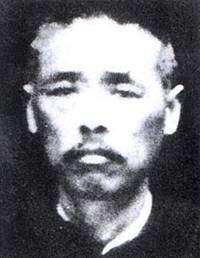 |
| 3 | Bo Gu 博古 (1907–1946) |
September 1931 | 17 January 1935 | 3 years and 139 days | 6th (1928–45) | — |
 |
| 4 | Zhang Wentian 张闻天 (1900–1976) |
17 January 1935 | 20 March 1943 | 8 years and 63 days | 6th (1928–45) | — |
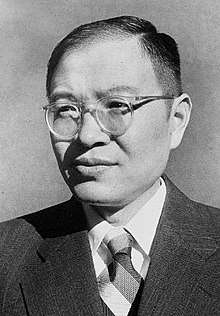 |
| 5 | Mao Zedong 毛泽东 (1893–1976) |
20 March 1943 | 9 September 1976 | 33 years and 174 days | 6th (1928–45) 7th (1945–56) 8th (1956–69) 9th (1969–73) 10th (1973–77) |
|
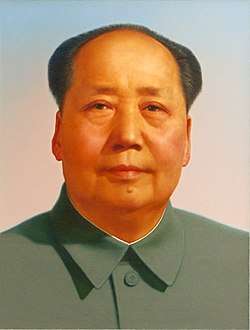 |
| 6 | Hua Guofeng 华国锋 (1921–2008) |
7 October 1976 | 28 June 1981 | 4 years and 265 days | 11th (1977–82) | 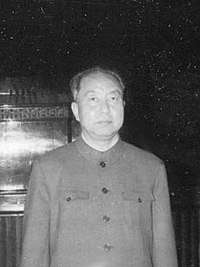 | |
| 7 | Hu Yaobang 胡耀邦 (1915–1989) |
29 June 1981 | 15 January 1987 | 5 years and 201 days | 11th (1977–82) 12th (1982–87) |
|
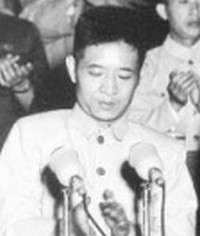 |
| 8 | Zhao Ziyang 赵紫阳 (1919–2005) |
16 January 1987 | 24 June 1989 | 2 years and 160 days | 12th (1982–87) 13th (1987–92) |
.jpg) | |
| 9 | Jiang Zemin 江泽民 (born 1926) |
24 June 1989 | 15 November 2002 | 13 years and 145 days | 13th (1987–92) 14th (1992–97) 15th (1997–02) |
 | |
| 10 | Hu Jintao 胡锦涛 (born 1942) |
15 November 2002 | 15 November 2012 | 10 years and 1 day | 16th (2002–07) 17th (2007–12) |
 | |
| 11 | Xi Jinping 习近平 (born 1953) |
15 November 2012 | Incumbent | 7 years and 226 days | 18th (2012–17) 19th (2017–22) |
|
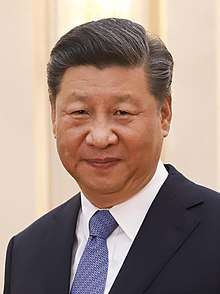 |
See also
- General Secretary of the Communist Party of China
- Chairman of the Central Military Commission
- Paramount leader
- Leadership core
- Politburo Standing Committee of the Communist Party of China
- Orders of precedence in the People's Republic of China
- List of leaders of the Kuomintang
- List of leaders of the Democratic Progressive Party
- List of national leaders of the People's Republic of China
References
Citations
- Wu 2015, p. 10.
- Wang 2012, p. 12.
- 19th National Congress (2017). Constitution of the Communist Party of China. p. 18.
- Wu 2015, pp. 10–11.
- Wu 2015, p. 11.
Sources
- General references
References for when the individuals were elected to the office of CPC leader, the name of the offices and when they established and were abolished are found below:
- Wang, Gungwu (2012). China: Development and Governance. World Scientific Publishing Company. pp. 12–13. ISBN 978-9814425841.
- 19th National Congress (2017). Constitution of the Communist Party of China Communist Party of China.
- Articles and journal entries
- Dittmer, Lowell (March 1983). "The 12th Congress of the Communist Party of China". The China Quarterly. Cambridge University Press on behalf of the School of Oriental and African Studies: 108–124. JSTOR 653335.
- Books
- Wu, Guoguang (2015). China's Party Congress: Power, Legitimacy, and Institutional Manipulation. Cambridge University Press. ISBN 978-1-107-08202-1.
.svg.png)